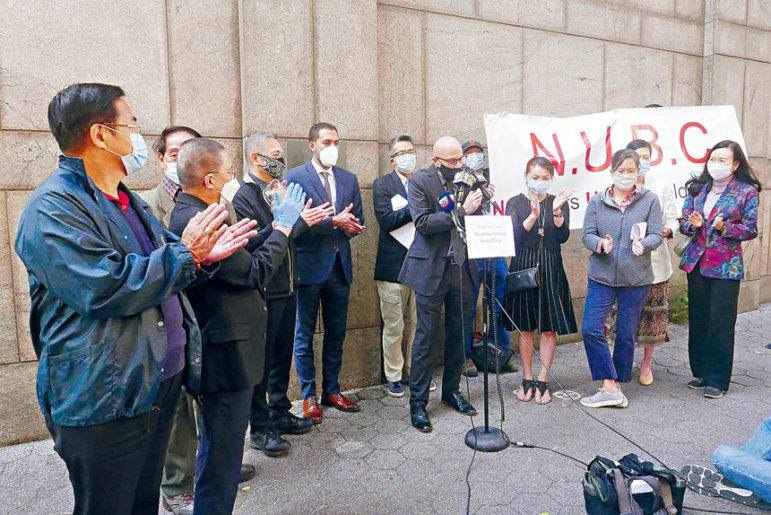Although the city is set to appeal, members of Neighbors United Below Canal said they believe the final victory belongs to the community.

Sing Tao
NUBC members declared victory after a state judge backed their lawsuit against the new Manhattan jail.This article was originally published in Sing Tao Daily.
Translated by Rong Xiaoqing from Chinese.
Members of the Neighbors United Below Canal (NUBC), an organization fighting against the city’s plan of expanding the Chinatown detention center, were thrilled by the State Supreme Court’s decision to halt the plan on September 21.
At a celebration held a day later in front of 125 White Street where the detention center is located, members of the organization claimed victory in their lawsuit and said it is a historic win for the community. Although the city is set to appeal, members of NUBC said they believe the final victory belongs to the community.
The jail plan has triggered broad resistance in Chinatown and led to the lawsuit from residents. Judge John Kelley found that the city failed to follow the procedure to re-do the scoping and environmental impact review after the location of the proposed jail was changed from 80 Center Street to 124-125 White Street. The judge found such violations “undermined the integrity and fairness of the process.”
The judge also agreed with the health impact research conducted by the NUBC and the NYU Langone Center that the city’s plan of demolishing the current detention center and building on the site a high rise jail would lead to a massive construction project that would critically damage the health of an already vulnerable population of seniors. And this is against the “fair share” principle of the distribution of community resources.
“Chinatown versus the city is like David versus Goliath. And we won as the underdog. How can we not feel ecstatic?” said Edward Cuccia, one of the attorneys representing the residents in this case. “Chinatown hasn’t fully recovered from the 9/11 attacks, and now it is hit by COVID-19. We need to revitalize the economy here, not to spend money to expand the jail.”
Christopher Marte, co-founder of the NUBC, said the battle against the new jail has been going on for two years. Residents spoke up in many city hearings and organized numerous protests. But their words only fell on deaf ears, he said. The lawsuit was their last option, Marte said. Fortunately, he added, the judge heard the voices of the residents.
Jan Lee, another co-founder of the NUBC said the nearly $2 billion of the $11 billion jail expansion project that was allocated for Chinatown must be more responsibly allocated. The pandemic has severely reduced the city’s revenues, and budgets for education and social services have all been cut. To spend a big amount of money on expanding the jail is immoral, and it would further destroy Chinatown. He said the community is against the new jail because it doesn’t believe any building can solve the problems of criminal justice. The court’s decision has proved that the law sides with justice.
Lee said the city has bundled the four borough-based jail plans into one ULURP. Now that Chinatown has won its case, residents in the Bronx and Queens who filed similar lawsuits against the jail plans in their neighborhoods can be hopeful too.
“When we started our battle, many people thought the borough-based jail proposal was a done deal, and the community’s resistance would be in vain,” said Jill Sung, president of the Abacus bank. “But the case has proved that it’s worth it to stand up and fight persistently against injustice.”
Jonathan Lippman, former Chief Judge of the State and chairman of the Independent Commission on New York City Criminal Justice and Incarceration Reform, said in a statement that the city should keep pushing smaller jails, and start to build a green future for Rikers Island. “Closing the dysfunctional, shameful jails on Rikers Island is an urgent moral imperative, today more than ever,” he said in the statement.








